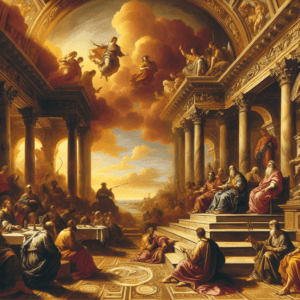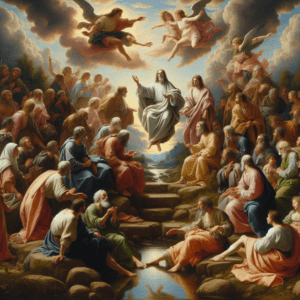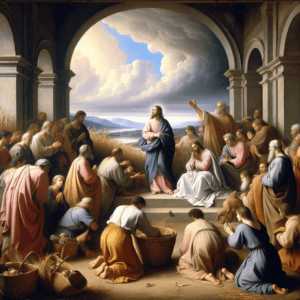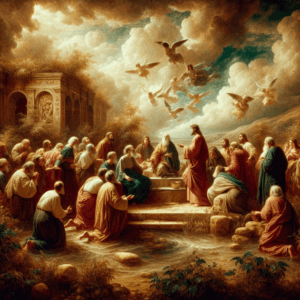SARAI’S SUGGESTION
As we come to this chapter, I must confess that I almost wish it were not in the Bible. After Abram rose to the heights in chapter 15, you would say that he certainly is treading on high places—but he is not perfect.
In chapter 16 we see the lapse of this man’s faith relative to Sarai and Hagar, the Egyptian maid. We have here the unbelief of both Sarai and Abram, and the birth of Ishmael. This is certainly a letdown after the wonder of the previous chapter.
Genesis 16 continues to follow the life of one of Israel’s greatest patriarchs: Abram, who will soon be renamed Abraham.
To this point, Abram and his wife Sarai are still childless, despite Abram being well over seventy-five years old (Genesis 12:4). In fact, at this point in the narrative, Abram is pushing ninety (Genesis 16:16)!
In the prior chapter, Abram has voiced his concerns to God about the situation, and God has responded with a dramatic demonstration of His intentions.
For all these many years, Abram has resisted following the normal practices of his day. Abram and Sarai were wealthy. They had many servants. Abram could have taken many wives.
He chose, instead, to wait for God to fulfill the promise of children through his barren wife Sarai. Until now. With Abram in his mid-80s, Sarai has apparently become tired of waiting.
In her eyes, it is time to go to plan B: giving her Egyptian servant girl Hagar to Abram, in order to finally obtain a child.
Apparently, if a wife was unable to bear children, it was considered appropriate for her to give a servant to her husband, as another wife, with the understanding that any children born to that servant would rightfully become the child of the original wife.
In a disappointing moment of faithlessness, Abram agrees, and Hagar quickly becomes pregnant.
Genesis 16:1-5 KJV
[1] Now Sarai Abram’s wife bare him no children: and she had an handmaid, an Egyptian, whose name was Hagar.
[2] And Sarai said unto Abram, Behold now, the LORD hath restrained me from bearing: I pray thee, go in unto my maid; it may be that I may obtain children by her. And Abram hearkened to the voice of Sarai.
[3] And Sarai Abram’s wife took Hagar her maid the Egyptian, after Abram had dwelt ten years in the land of Canaan, and gave her to her husband Abram to be his wife.
[4] And he went in unto Hagar, and she conceived: and when she saw that she had conceived, her mistress was despised in her eyes.
[5] And Sarai said unto Abram, My wrong be upon thee: I have given my maid into thy bosom; and when she saw that she had conceived, I was despised in her eyes: the LORD judge between me and thee.
Genesis 16:1 KJV
Now Sarai Abram’s wife bare him no children: and she had an handmaid, an Egyptian, whose name was Hagar.

The previous Chapter sets out the faithfulness of God, this Chapter, the faithlessness of Abraham.
In the previous chapter, the Lord had directly promised Abram that his heir would be his own flesh and blood (Genesis 15:4). Abram would have a son, and not merely a servant, as his heir.
That specific promise does not seem to have been given to Sarai, Abram’s wife. At the very least, she does not seem to trust God’s work in the situation. It’s also possible she doubted that Abram’s heir was meant to be born through her.
In any case, it had not happened yet, and the ticking of the clock must have sounded quite loud as Abram was now well into his 80s and she in her 70s.
Sarai has an idea to help the plot along, however. Hagar was Sarai’s servant, or “slave girl.” Slavery in this era was vastly different from what modern people picture.
A closer term for today’s world might be an “indentured servant.” This was a one-sided arrangement, to be sure, but the relationship, as seen in the following verses, was not as simplistic as slave-to-master.
It’s possible that Sarai took possession of Hagar, an Egyptian, when Sarai had been taken by the Pharaoh for his wife (Genesis 12:10–20).
Sarai proposes her alternative plan to provide Abram an heir in the following verse.
Genesis 16:2 KJV
And Sarai said unto Abram, Behold now, the LORD hath restrained me from bearing: I pray thee, go in unto my maid; it may be that I may obtain children by her. And Abram hearkened to the voice of Sarai.

Meaning that it wasn’t the Lord who spoke to Abraham. Proclaims the impatience of unbelief; the “flesh” quickly tires of waiting for the Divine promise. The path of Faith is full of dignity, the path of unbelief full of degradation.
Tired of waiting, they no longer set their hopes upon God, but rather upon the Egyptian slave girl. Which means that the Patriarch was not hearkening to the Voice of the Lord.
Abram possessed a direct promise from the Lord that he would have a flesh-and-blood heir, his own son (Genesis 15:4). As of this time, however, this has still not happened, and Abram is in his mid-80s (Genesis 16:16).
Interestingly, Sarai holds the Lord responsible for her inability to bear children. In her mind, He is the one preventing this from happening.
As a matter of fact, God may have been doing exactly that: executing His plan for their lives in His own timing. Sarai, though, didn’t want to wait any longer to see what would happen.
Her plan may well have been a normal custom in the culture of their day. If a wife could not bear a child herself, she could assign the role to a servant who would become another wife to the husband.
If the servant became pregnant, the child would still belong to the first wife, as the servant was her property. As repulsive as that may sound to our modern ears, it was the way of the time.
And, the “slavery” of that era was very different from the brutality modern readers assume when they encounter that word.
Still, this must not have been something Abram had ever chosen to do before. He had countless servants. He surely could have had any number of wives.
And yet, to this point, Abram had remained committed to seeing God’s promise fulfilled through Sarai and no other woman. Now, however, he allows Sarai to convince him to try it.
It will become clear that this is not the way God intends to build His covenant people.
Genesis 16:3 KJV
And Sarai Abram’s wife took Hagar her maid the Egyptian, after Abram had dwelt ten years in the land of Canaan, and gave her to her husband Abram to be his wife.

The Epistle to the Galatians declares that Sarah and Hagar represent the two principles of Law and Grace. Hagar represents salvation by works. Sarah Salvation by Faith.
These principles are opposed to one another. Ishmael is born as the result of man’s planning and energy. Isaac is born as the result of God’s planning and energy.
In the birth of Ishmael, God had nothing to do with it and, as regards the birth of Isaac, man was dead. So it is today, salvation by works entirely depends on man’s capacity to produce them.
Salvation by Faith upon God’s ability to perform them; under a covenant of works, God stands still in order to see what man can do. Under the Covenant of Grace, man stands still to see what God has done.
The two covenants are opposed; it must be either Hagar or Sarah; if Hagar, God has nothing to do with it; if Sarah, man has nothing to do with it.
As stated, ten being the number of completion, is it possible that, at this time, God had planned to bring forth Isaac?
Or better yet, how much do our failures of faith hinder in our lives that which God desires to do?
Or worse still, how much does it delay us with what He desires to do?
The previous verses described Sarai’s plan to “help” God accomplish His promises to Abram. Instead of waiting to see if God would give Abram an heir through Sarai, she would give a servant girl she owned to Abram as a second wife.
If the girl became pregnant, per the customs of the day, the baby would belong to Sarai. It’s possible that Sarai thought God’s intent was to provide a son through someone other than her.
It’s also possible Sarai simply didn’t want to wait any longer for God’s fulfillment. Either way, this is a plan born out of desperation. The end results will be unfortunate, but not unexpected (Genesis 16:7–12).
It has been a full decade since the initial promise, and Sarai is still barren. By Abram and Sarai’s way of thinking, it is time for them to help God’s plan along.
They want for themselves what God wants for them; they just don’t want to wait for Him to give it to them in the traditional way. So, they don’t.
Genesis 16:4 KJV
And he went in unto Hagar, and she conceived: and when she saw that she had conceived, her mistress was despised in her eyes.

She began to act unkindly toward Sarah, actually with contempt!
Sarai’s plan to obtain a son, both for Abram and for herself, through her own servant Hagar, seems to be working. Hagar became Abram’s second wife and she quickly becomes pregnant with his son.
This is something which had not happened for Sarai in her entire life with Abram, including the 10 years in Canaan after God’s latest promise of an heir (Genesis 16:3).
However, this immediate pregnancy complicates Abram’s family life. Hagar, now wife of Abram and bearer of his only child, begins to resent the woman who will claim that child as her own.
Hagar may have wondered what she and Abram even needed Sarai for. If Hagar could give him children, wasn’t Sarai unnecessary? Also, in that culture, barrenness was considered a sign of a defect, even divine disapproval.
The fact that Hagar could immediately conceive, when Sarai could not after years and years, might have tempted Hagar to see herself as superior to her master.
However it was motivated, Sarai feels Hagar’s contempt, and it wounds her deeply, as the following verses will reveal.
Genesis 16:5 KJV
And Sarai said unto Abram, My wrong be upon thee: I have given my maid into thy bosom; and when she saw that she had conceived, I was despised in her eyes: the LORD judge between me and thee.

Abraham and Sarah think that, by their clever plan, they can hasten and bring to pass the Divine Promise; the result is misery; he succeeds in his plan, Ishmael is born; but better were it for Abraham and the world had he never been born!
It is disastrous when the self-will plans of the Christian succeed. Sarah now sees her wrong, but too late! Works of the flesh, and this definitely was a work of the flesh, always bring on dissension.
The plan to “help” God fulfill His promises by giving Hagar to Abram was Sarai’s idea in the first place. A decade before (Genesis 16:3), God had once again promised to make Abram a great nation.
This specifically included giving Abram a biological son (Genesis 15:4). For all of this time, Abram has chosen not to speed up God’s timetable by marrying other wives.
He has been waiting for God to fulfill the promise through Sarai, who was barren. Sarai thought the time had come to follow the custom of the day and marry her own servant to Abram to produce an heir.
By that same custom, any heir would belong to Sarai as the “owner” of Hagar, her slave girl.
What Sarai seems to have failed to anticipate was Hagar growing contemptuous of her. Perhaps with good reason, Hagar would not relish the idea of giving up her child to Sarai and remaining the servant.
She was Abram’s wife, too, after all. Also, in that culture a woman’s fertility was seen as a sign of her worth. So, Hagar’s ability to conceive immediately for Abram, when Sarai had been childless for decades, could have been a source of pride or contempt for Hagar.
Regardless of the reasons, or how Hagar might have acted, this contempt was not lost on Sarai.
Wounded by Hagar’s attitude, Sarai complains to Abram. Her speech suggests she held him responsible for what had happened. In truth, though the plan was Sarai’s idea (Genesis 16:2), Abram was responsible.
He approved of the plan, he allowed it to happen, and he followed through with it. It was his responsibility to declare whether or not Sarai retained her authority over Hagar.
It’s interesting to note that Sarai invokes the Lord’s name in her angry plea to Abram. She calls on God to be the ultimate judge in this matter, going over Abram’s head, in a sense.
That was enough for Abram, as the next verse will reveal.
I hope that you have really enjoyed this post,
Please Leave All Comments in the Comment Box Below ↓













I found your Bible study on Genesis 16 to be enlightening.
The story of Hagar and Sarai offers valuable lessons on trust and God’s faithfulness.
Have you encountered other passages that similarly emphasize the importance of patience and faith in God’s plan?
Personally, I’ve drawn inspiration from stories like Joseph’s in Genesis, where adversity ultimately led to greater blessings.
Your analysis of Hagar’s perspective adds depth to the narrative. It’s a reminder that each character in the Bible plays a unique role in God’s larger plan.
How do you think modern readers can apply Hagar’s resilience and trust in their own lives?
Your insights would be greatly appreciated.
Thank you for sharing this thoughtful study.
Hello pasindu,
I appreciate you taking the time to let me know that you feel that this Bible study on Genesis chapter 16, is enlightening.
Philippians 4:6 KJVS
Be careful for nothing; but in every thing by prayer and supplication with thanksgiving let your requests be made known unto God.
Romans 12:12 KJVS
Rejoicing in hope; patient in tribulation; continuing instant in prayer;
Are a couple of passages that similarly emphasize the importance of patience and faith in God’s plan, in my opinion.
Modern readers can apply Hagar’s resilience and trust in their own lives through constant prayer, belief, fasting, scripture study and focussing on GOD without ceasing.
Thank you for appreciating my insights, and you are most certainly welcome for the sharing of this thoughtful study.
Blessings My friend!
Hi there and thanks for sharing this interesting article!
I also study the Bible, and you have shared very interesting and important message from the Book of Genesis. Abraham was chosen by God and he was faithful, but because of Sarah – his wife, he decided to take Hagar as his wife and obtain a child from her. But everything was planned by God.
In Brit Hadasha (New Testament) we can read that Abraham believed in God’s Word and he was called a friend of God. God’s plan was to create two great nations: Israelites and Arabs (they come from Ishmael). Two nations who will be completely separated. In the next generation we can see similar story as his son Itzhak (Izaak) had two sons as well: Esau and Jacob.
But the only one was chosen by God. The second one (Ishmael, and Esau) became an enemy of his brother. Today we have the same situation: children of Adonai who follow His word and His Son YESHUA The Messiah (Jesus) and the children of devil.
Good and Evil. All the time in our history, from Adam and Eve, and their sons Kain and Abel, till today’s world where we have people who love God and keep His commandments and the second group: people who rebel against God, his Son YESHUA and His commandments.
Praise YESHUA!
HalleluYAH!
All the best for you!
Hello Blazej777,
Thank you for stopping by, considering the sharing of this article interesting. Thank you for adding value to this HBS & DwJ Platform with the information you study as well.
Your opinion on this topic is very much appreciated.
All The Best And Blessings To You My Friend!
“Sarai’s Suggestion” is a thought-provoking and significant chapter in the biblical narrative of Abraham and Sarah.
This study appreciates the depth and complexity of the story, highlighting the human imperfections and the underlying themes of faith, trust, and God’s plan. The final section underscores the significance of this chapter in the broader biblical narrative, emphasizing the consequences of self-will and the importance of patience in God’s timing.
Overall, “Sarai’s Suggestion” is a story that offers valuable insights into the human condition, faith, and God’s plan. The review successfully captures the depth and intricacies of the narrative, making it a compelling and thought-provoking read.
Hello Gena,
Thanks for stopping by, and since you like it so much, thank you for continuing to stop by in advance, adding value to this HBS & DwJ Platform.
Your opinion on this topic, as well as all of the others you will comment on, is very much appreciated.
Blessings To You My Friend!
This post on Genesis 16 personally helped me grow closer to GOD.
It reminded me to stay faithful to god and trust his plan. Hager’s point of view is insightful as it shows how he played a massive role in god’s plan. Having Hager’s resilience is what a lot of us should practice to have.
I see how God choose him to follow his enormous plan.
Hello Anoth,
Thank you for stopping by and considering Sarai’s Suggestion – Unbelief Actions an insightful point of view.
I often pray to GOD for understanding during my Holy Bible Study Sessions, and I find that doing so in turn, helps me to grow closer to GOD.
Thank You for commenting on this episode of HBS & DwJ.
Blessings My Friend!
Man, I didn’t expect to stumble on this story again, and after reading it, I felt something deep again.
I think the foundation play that we see in real life, movies, teachers, between a man and a woman, it’s so cultivating. The need to have it all even after you got a promise for it. Patience will pay off if you follow the words of God (which is similar to a personal goal, in this case, a family goal).
And as the beginning of mankind on earth with Adam and Eve, this one got ruined. The woman proposed a way out, and the man didn’t refuse and played along. A forbidden fruit in the face of a younger fertile woman or your promise given to your wife. Breaking the chains of the family also broke his name, so Abram now has to wonder for ten years in Caanan (where if I remember right, it’s not cool, there is rape, robbery, etc. Correct me if I’m wrong, this is from memory).
I feel the Genesis stories are a strong read for organizing your personal life.
And I like the topic on it.
Hello Stefan ivanov,
Thank you for stopping by and commenting on Sarai’s Suggestion – Unbelief Actions.
I definitely agree, that the Genesis stories are a strong read for organizing your personal life. Your comment was well stated.
Thank you again for your time,
Blessings My Friend!